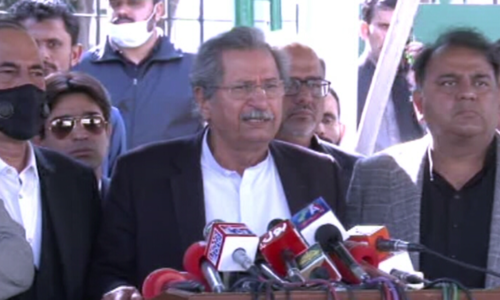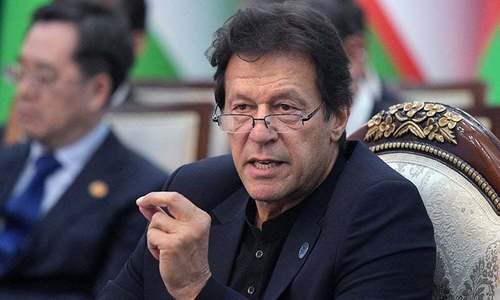• AGP explains secrecy has been held not to be absolute and eternal
• Four-to-one majority opinion asks ECP to take all measures to conduct fair elections and guard against corrupt practices
• Justice Yahya Afridi rejects presidential reference for not being a point of law
ISLAMABAD: Two days before the March 3 Senate polls, the Supreme Court on Monday ruled that elections for the upper house of parliament have to be conducted through secret ballot as required under the Constitution.
The four-to-one majority opinion on a presidential reference was interpreted by both the government and the opposition in their favour. However, Justice Yahya Afridi in his minority opinion held that the presidential reference was not a point of law and be rejected.
The detailed reasons of both opinions will be issued later.
Since the much-awaited majority opinion affirms that the Senate elections are under the Constitution, these have to be held through secret ballot instead of open ballot as sought by the government through the presidential reference.
The majority opinion, consented by Chief Justice Gulzar Ahmed, Justice Mushir Alam, Justice Umar Ata Bandial and Justice Ijaz-ul-Ahsan, held that the Senate elections were held “under the Constitution” and the law, but the ball will now be in the court of the Election Commission of Pakistan (ECP) in terms of Article 218(3) of the Constitution which ensures that the elections are conducted honestly, justly, fairly and in accordance with the law and that corrupt practices are guarded against on which the apex court had issued successive judgements, the most exhaustive being 2012 Workers Party Pakistan through Akhtar Hussain.
Soon after the announcement of the opinion, all sides jumped into the fray by interpreting the opinion in their own way. The ruling PTI claimed success, stating that the ECP had been directed to make arrangements for traceable ballot.
In a statement, Attorney General for Pakistan (AGP) Khalid Jawed Khan, who has tested positive for Covid-19, said the ECP was constitutionally bound to follow the opinion of the Supreme Court and implement it for the upcoming Senate elections. “The opinion is binding and ignoring or violating order of the apex court amounts to contempt and misconduct,” he explained, adding that it was for the ECP to use technology and choose the method like barcode or serial number on ballot papers as secrecy had been held not to be absolute and eternal.
“The polls shall be by secret ballot but secrecy may end there,” the AGP said, adding that the ECP was bound to print such identifiable or traceable ballot papers under Section 122(5) of the Elections Act 2017, which empowers the commission to print ballot papers as it may prescribe.
“No change in law is required to give effect to the opinion as Section 122(5) is the existing law and, therefore, ECP has to do it in the light of the opinion delivered.
Thus, if after the election there is any material or evidence suggesting corrupt practice, not only the party head but any citizen can lodge complaint with available material or evidence against any voting MPA/MNA with ECP and, if there is prima facie case, ECP is bound to investigate and trace the ballot to see whether any corrupt practice occurred or not and if ECP does not, the complainant can go to the court or the tribunal to see if vote was actuated by corrupt practice,” the AGP explained.
On the other hand, Sindh High Court Bar Association (SHCBA) president Salahuddin Ahmed said the short order placed the ball in ECP’s court and made a general declaration about the interpretation of secrecy of the ballot but did not give any specific directive to the commission to make the ballot traceable or identifiable.
“It [apex court] leaves it to ECP to introduce such measures which would eradicate corruption from elections,” Mr Ahmed said, adding that it did not even give a timeline for such measures, presumably because the ECP is the only competent body under the Constitution for the conduct of elections and perhaps because the court was cognisant that it was only hearing the matter in its advisory jurisdiction and hence could give an opinion, but not issue ancillary directives.
Therefore, he said, it was up to the ECP to discuss and implement reforms and measures to improve electoral transparency and, in keeping with court observations, should try and do so with all reasonable dispatch. Obviously, it may not be possible to implement any reforms before the Wednesday Senate elections, he said point blank.
Senior counsel Salman Akram Raja was of the opinion that the Supreme Court had recognised primacy of the ECP as the highest constitutional body in all matters pertaining to the conduct of elections under the Constitution. While recognising the need for dilution in secrecy of the ballot, the Supreme Court has left it to the ECP to determine the circumstances in which exception to complete secrecy of the ballot might be called for and the manner in which such secrecy is to be limited, he said.
Mr Raja explained that the apex court had not held that any political party winning fewer than the expected seats in the Senate would itself constitute the evidence of corrupt practices. “It is for ECP to define what would constitute corrupt practice for the purpose of lifting the veil of complete secrecy on the ballot,” he said.
Senior counsel Chaudhry Faisal Hussain was of the view that this advice strengthened the ECP and that the apex court had refused to bear the responsibility to avoid entertainment of political questions. “This may be read as apex court’s approach to shift its direction towards strengthening other institutions,” he said, adding that it was unlike the earlier Supreme Court under Justice Iftikhar Muhammad Chaudhry, which had needlessly imposed itself on every other institution and disturbed their functioning to a great extent.
“This court is willing to empower and give other institutions a proper space to improve their working and strengthen,” Mr Hussain said, adding that it was now upon the ECP to find a way out to stop corrupt practices which was their constitutional and prime responsibility.
Advocate Chaudhry Hassan Murtaza Mann said the SC opinion had relied on the 1967 Niaz Ahmad versus Azizuddin case and held that the secrecy question had already been dealt with and, therefore, the ECP could easily look into and follow the parameters.
“In my opinion, there is no decision in that judgement with regards to making traceable ballots and, therefore, it will be impossible for ECP to devise a technique to make the voters traceable through ballot in such a short period of time when the elections are already upon us. Such practice requires many months,” he said.
The eight-page majority opinion stated that the ECP was required by the Constitution to take all necessary steps in order to fulfil this mandate/duty in terms of Article 222 of the Constitution, which empowers parliament to legislate on the conduct of elections and matters relating to corrupt practices and other offences in connection with elections, but categorically provides that “no such law shall have the effect of taking away or abridging any of the powers of the commissioner or ECP” under Part VIII, Chapter 1 of the Constitution.
In terms of Article 220 of the Constitution, the opinion said, all executive authorities in the federation and the provinces were obliged to assist the commissioner and ECP in discharge of their functions, as provided for in Article 218(3) of the Constitution.
As far as the secrecy of ballot is concerned, the opinion said, this court has already answered this question in a judgement by a five-judge bench of this court reported as 1967 Niaz Ahmad versus Azizuddin, where it has been held that secrecy was not absolute and that “the secrecy of the ballot, therefore, has not to be implemented in the ideal or absolute sense but to be tempered by practical considerations necessitated by the processes of election”.
“Furthermore, in order to achieve the mandate of ECP in terms of Article 218(3), read with Article 220 and other enabling provisions of the Constitution and the law, ECP is required to take all available measures including utilising technologies to fulfil the solemn constitutional duty to ensure that the election is “conducted honestly, justly, fairly and in accordance with law and that corrupt practices are guarded against,” the opinion said.
Published in Dawn, March 2nd, 2021















































